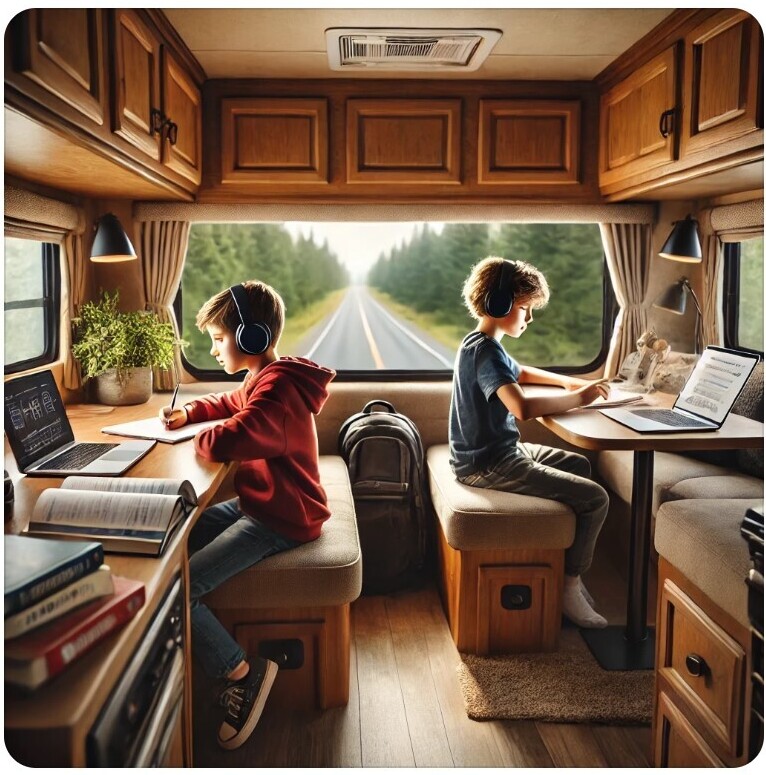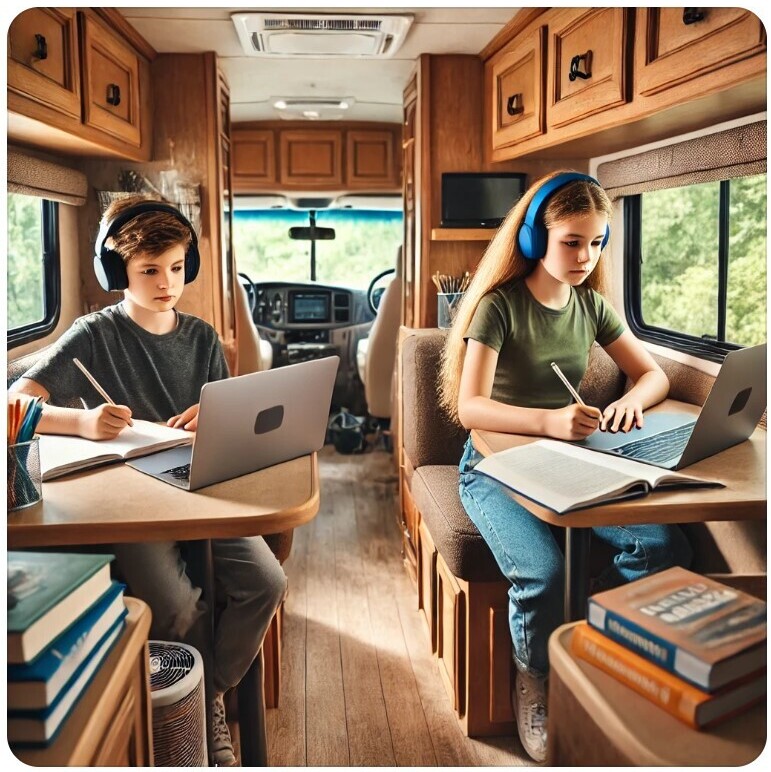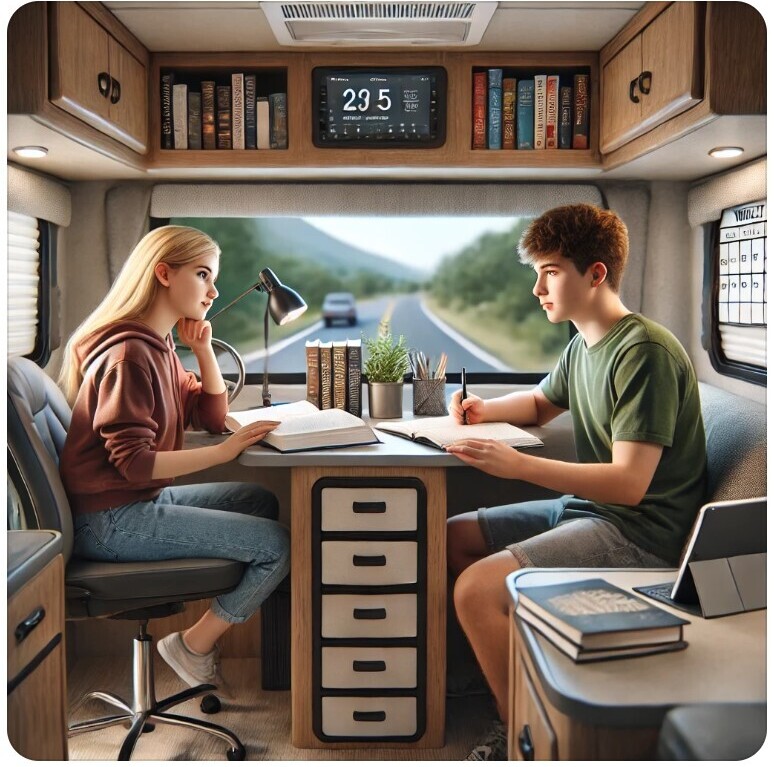Finding the right spot for learning in a motorhome or travel trailer can seem tricky, but it doesn’t have to be. Start by choosing a corner or table where the kids feel comfortable and aren’t easily distracted. This space should make it easy to focus without competing with the views out the window. Adding some personal touches or school supplies nearby helps to remind everyone that it’s time to get schoolwork done.
Keeping everything organized is key when space is tight. Use storage solutions like bins or baskets for books and supplies to keep everything tidy. Labeling bins or using color codes can make finding and putting away things easier. It’s amazing how even small spaces can feel more open with a little organization magic.
To make things run smoothly, you’ll need reliable RV internet connectivity. Whether it’s for finding resources or joining virtual classrooms, good internet is a must. In many areas, Wi-Fi signals come and go, so having hot spots or signal boosters can save the day.
Remember, having a backup plan for when the internet is spotty can keep the learning going smoothly. When tech plays nice, lessons stay on track no matter where the road takes you.
Craft a Flexible Curriculum
When you’re schooling on the road, flexibility becomes your best friend. Sticking to a rigid curriculum isn’t always possible or even necessary. It’s all about adapting the curriculum to fit the lifestyle and rhythm of travel.
Instead of feeling bound by traditional education models, consider blending different resources to craft a more personalized educational experience. Textbooks, online resources, and educational apps all bring something unique to the table.
Balancing structure with freedom in learning keeps things engaging for your kids. You don’t have to be stuck at the table for hours. Use workbooks for structured learning and then let creativity take the wheel. Encourage project-based tasks like creating travel documentaries or journaling daily adventures. This keeps learning fresh and relevant to the real-world experiences happening every day outside the RV.
Travel opens up incredible learning opportunities that textbooks alone can’t offer. When visiting a city, dive into the history, geography, and culture that it offers. Take a walk, snap some photos for a project, or even try a local dish. These experiences embed knowledge and print memories that outlast typical classroom lessons. By weaving travel into your curriculum, learning hits a whole new level of depth and fun.
Schedule and Routine for RV Homeschooling
Creating a routine in the ever-changing world of RV life can make a huge difference. While flexibility is key, having a bit of structure can bring a sense of normalcy to the day. Carving out specific hours for school helps kids understand when it’s time to focus and when it’s time to relax. Even a loose schedule can prevent chaos and keep the day organized.
Balancing learning with travel and fun can be a juggling act. It’s important to plan schoolwork around travel days to avoid cramming education into moments that are best spent enjoying new destinations. Try using quiet travel times for reading or educational games, and reserve stationary days for projects that need more focus and space.
Breaks and fun activities are just as important as schoolwork. Kids need time to let loose and explore their surroundings. Regular breaks not only keep spirits high but also help information sink in better. Think short hikes, playing in nearby parks, or even an impromptu field trip to a local museum. These activities refresh young minds, making it easier to dive back into academic routines when it’s time.
Utilizing RV Travel as an Educational Tool
RV travel offers a special chance to turn every destination into a classroom. Traveling to new places means firsthand learning experiences that you just can’t get from a book. Engage the kids with the geography and history of each location and watch their world expand.
Each destination offers unique educational opportunities. Walking through historical sites, visiting museums, or exploring nature parks translates directly into lessons about history, science, or the environment. Packing a few items like a magnifying glass or sketchbook can enhance these learning experiences, too.
Dive into the local culture wherever you stop. This could mean tasting new foods, learning basic phrases in a local language, or participating in community events. It’s these immersive experiences that make learning feel like an adventure, all while fostering adaptability and curiosity.
Keeping a record of these travels is another learning tool. Encouraging kids to document their journeys through journals, photo diaries, or blogs reinforces writing and storytelling skills. They can share their thoughts and observations about each place visited, which helps them reflect and make connections between what they’ve read and what they’ve seen firsthand.
These experiences broaden children’s perspectives and leave long-lasting impressions. When kids see and touch history and culture, they connect with the world in a way that’s exciting and meaningful. The road truly turns into a never-ending field trip where learning happens everywhere you go.
Maintaining Social Interactions for Homeschooled Kids
Keeping kids socially active while traveling in an RV takes a bit of planning, but it’s absolutely doable. The key is to connect with local homeschooling groups wherever you travel. Many communities have groups that welcome newcomers, offering a chance for the kids to make friends and you to swap homeschooling tips.
Online forums and virtual meetups are also great. Platforms like Facebook and specialized homeschooling sites host groups where traveling families share advice and arrange get-togethers. If you can’t find an in-person group, these online interactions can still provide socializing opportunities with kids from around the country, or even the globe.
Of course, playdates and local meet-ups add another layer to socializing on the road. Whenever possible, arrange playdates with kids your children connect with along the journey. Involve them in local activities or events, too. Parks, libraries, and community centers often host events that are perfect for making new friends.
Additionally, think about travel-friendly team sports or clubs that might interest your kids. Even if participation is temporary, being part of a team or group helps build crucial social skills. Many organizations welcome traveling families for short-term involvement, making it possible to keep kids engaged no matter where you are.
These interactions not only enhance social development but also help kids feel grounded and connected. While the scenery changes outside the RV window, strong social ties keep things balanced and create a support network that makes the traveling lifestyle rich and fulfilling.
Handling Challenges of RV Homeschooling
Managing space can feel like the trickiest part of homeschooling on the road, but it’s manageable with some creativity. Think multifunctional. Foldable desks or tables that tuck away after school hours can free up space for eating or relaxing. It’s all about maximizing the use of every inch without feeling cramped.
Tech and connectivity are another common hurdle. Wi-Fi can be unpredictable when traveling through rural areas. To manage, consider investing in a reliable mobile hotspot. Store materials offline when possible and download necessary content before hitting the road. This way, your family can keep learning whether parked in a cozy campsite or traveling through a remote area.
Packing for school requires some careful planning, too. Stick to essentials and versatile resources. Choose digital books or resources for subjects like math or reading to save space. Keeping a few physical materials for subjects like art or science can still be beneficial. Use vertical storage to make the most of the limited room in the RV.
Taking these steps not only helps smooth out the journey but also turns potential stumbling blocks into easy detours. Keep the challenges in perspective. With some planning, RV homeschooling becomes a rewarding adventure for both students and parents. The freedom of exploring new places while learning provides a rich tapestry of experiences that a traditional setting just can’t match.












Recent Comments